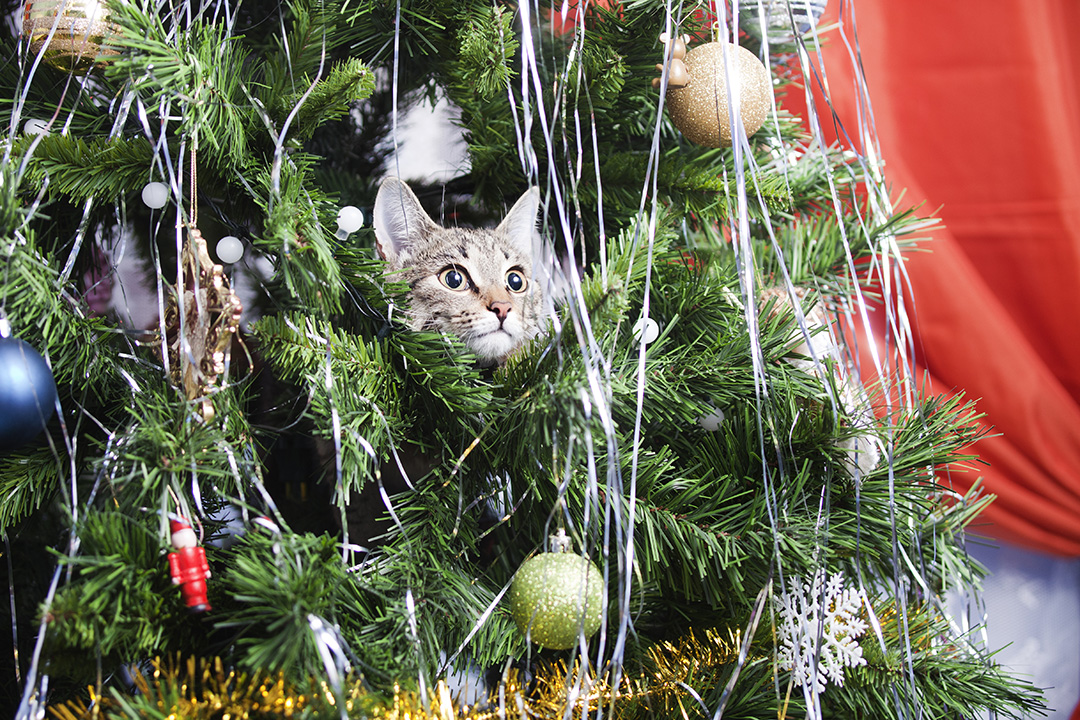
How to avoid holiday pet emergencies
There are a handful of common causes for end-of-year pet emergencies, so here’s an annual reminder from the Western College of Veterinary Medicine (WCVM) to help keep your pets safe over the busy holiday season.
By WCVM TodayPet-proof your décor. Christmas trees and pets don’t always go well together. Ensure your tree is well secured in case of kitty climbers, and place decorations above paw height. Where possible, use non-breakable ornaments and avoid tinsel. Cats and dogs may ingest these decorations, potentially risking intestinal damage and infection of the abdominal cavity. Cords for lights should be made inaccessible to pets, especially for puppies and kittens.
(Don’t) give a dog a bone. While it’s tempting to make pets part of a holiday meal, avoid giving bones to dogs or cats — particularly turkey bones. Poultry bones splinter easily and can cause serious injury, while bone fragments can cause intestinal blockages or lacerations.
Holiday baking. Grapes and raisins can cause kidney failure in dogs and there is also evidence that this occurs in cats as well. The clinical signs are not necessarily dose-dependent and can occur even with very small amounts of ingested grapes or raisins. Baking bread can also cause problems for pets — if a pet ingests raw bread dough made with yeast, the yeast may grow rapidly in the warm and moist environment of the animal's stomach. This can cause severe distension that affects breathing and blood flow in the body. Yeast fermentation can also release alcohol which can poison your pet.
Alcohol. Alcohol of any kind can irritate your pet's stomach or skin and can cause the animal to appear "drunk." About 30 to 60 minutes after a pet ingests alcohol, you might see signs such as vomiting, diarrhea, drooling, lack of co-ordination and difficulty breathing. Keep pets away from all alcohol — methanol can also be found in washer fluids and rubbing alcohol.
Chocolate. Pets metabolize chocolate differently than humans and even small amounts of chocolate can cause your pet to become sick. Chocolate can cause vomiting, diarrhea, a rapid heart rate and seizures. Dark chocolate is much more toxic to dogs than white chocolate, so be sure to tell your veterinarian what kind of chocolate and how much your animal has ingested.
Xylitol. Xylitol is an artificial sweetener found in gum, candies and in other sugar-free treats. Even small amounts of xylitol can cause life-threatening hypoglycemia in dogs. In larger doses, xylitol can cause liver failure and damage. Other clinical signs include collapse, weakness, jaundice and "tarry" stool.
Pretty plants can be poisonous. Poinsettias, mistletoes, ornamental pepper, Christmas rose, baby's breath (found in many floral arrangements) and lilies are popular during the holidays — but all of these plants are toxic to pets. Check with a veterinarian if you have questions about bringing plants into your home.
Painkillers. While common over-the-counter medications are fine for treating common aches and pains in people, both ibuprofen (Advil and other non-steroidal anti-inflammatory medications) and acetaminophen (Tylenol) cause serious problems for cats and dogs. Even a single acetaminophen tablet can be fatal in cats as they do not have the enzyme necessary to metabolize the drug like people do. Acetaminophen can also affect dogs: ingesting the medication can lead to liver failure and blood problems. Always consult your veterinarian if you think your pet has ingested a painkiller.
If you suspect a pet has chewed or ingested something unusual, call a veterinarian immediately. Pet owners can also call the fee-for-service Pet Poison Helpline at 1-855-764-7661.
The VMC will offer emergency services only for small and large animal patients during the December holiday season: from Thursday, December 25, 2025, to Thursday, January 1, 2026. Before bringing an emergency patient to the hospital, please call in advance and speak with a member of the clinical staff at the Small Animal Clinic (306-966-7126) or the Large Animal Clinic (306-966-7178).
Wishing you and your furry friends a safe and healthy holiday season!
